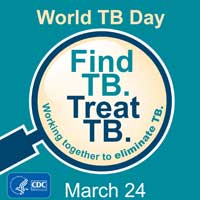Tuesday, March 24 is #WorldTBDay. Many people in the United States believe that #tuberculosis, or TB, was eradicated along with other diseases like smallpox and polio. Although the overall rate of TB in the United States has declined, it might surprise you to know that Western Queens has the highest incidence of tuberculosis in New York City.
TB is an airborne respiratory disease which can spread rapidly when an infected person coughs, sneezes, or speaks. It mainly affects the lungs, but other organs such as the kidneys, spine, or brain are sometimes involved.
TB impacts all ages, races, income levels, and both genders. Most TB cases in the U.S. are brought in from foreign countries, but those at risk include people who live or work with others who have TB, including healthcare workers, the homeless, and those in group settings like nursing homes. Those with impaired immune systems like Intravenous drug users, the elderly, and HIV patients are also at risk. For someone with diabetes, the risk of contracting TB is 2-3x more likely. However, repeated exposure to the germs is usually necessary before a person will become infected.
TB is diagnosed with a TB skin test. Additional tests to determine if a person has TB disease include X-rays and sputum tests.
Stages of TB are:
Exposure — contact or exposure to another person who is thought to have or does have TB. The exposed person will have a negative skin test, a normal chest X-ray, and no signs or symptoms of the disease.
Latent TB infection – diagnosed TB bacteria infection, but no symptoms of the disease. TB organisms can remain dormant in the body throughout life in 90 percent of people who are infected. This person would have a positive skin test, but a normal chest X-ray.
TB disease — signs and symptoms of an active infection determined by a positive skin test and a positive chest X-ray.
The symptoms of TB may resemble other lung conditions or medical problems. If you’d like to make an appointment for a TB skin test, please contact the Ambulatory Care Center at Flushing Hospital Medical Center at 718-670-5486.
For more health and fitness information and tips, follow us on Twitter @FHMC_NYC and like us on Facebook www.facebook.com/FlushingHospital
All content of this newsletter is intended for general information purposes only and is not intended or implied to be a substitute for professional medical advice, diagnosis or treatment. Please consult a medical professional before adopting any of the suggestions on this page. You must never disregard professional medical advice or delay seeking medical treatment based upon any content of this newsletter. PROMPTLY CONSULT YOUR PHYSICIAN OR CALL 911 IF YOU BELIEVE YOU HAVE A MEDICAL EMERGENCY.

